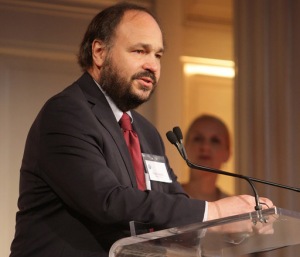Alex Counts is president, CEO and founder of Grameen Foundation, and author of several books, including Small Loans, Big Dreams: How Nobel Prize Winner Muhammad Yunus and Microfinance are Changing the World.
The ongoing saga of the confrontation between the Bangladesh government and its allies in the local media on the one hand, and Professor Yunus, the Grameen Bank and its 8.3 million borrower-owners on the other, has taken some surprising turns in the last 10 days. On April 20, representatives of Grameen Bank’s employee association held a well-attended press conference, covered by The Daily Star and other print and electronic media, where they presented the signatures of 20,103 colleagues who urged the government to either allow Prof. Yunus to remain as Managing Director or, failing that, to appoint him as Chairman of the Bank’s Board of Directors. This follows a similar effort by the borrower-owners of Grameen Bank, 3.7 million of whom signed hastily circulated petitions several weeks ago demanding that Prof. Yunus be allowed to remain as the bank’s chief executive.

Professor Muhammad Yunus listens to some of Grameen Bank's borrower-owners at a local Center meeting.
More recently, the so-called “Review Committee” appointed by the government to probe into the affairs of Grameen Bank and its sister organizations submitted its report – spanning more than 100 pages, according to some sources – to the Minister of Finance. While the report has not been officially released, portions of it have been leaked to government-aligned media outlets.
Soon after receiving the report, the Finance Minister commented on it to the press. His two principal messages, as covered by the AFP wire service, were that there was no improper diversion of Norwegian aid funds in the 1990s, as had been reported in the media, and that Grameen not only did not charge “excessive” interest rates, but that it in fact charges the lowest rate of interest among microfinance organizations in the country.
Neither of these “findings” were surprising to anyone who has been following this story closely and without bias, but it was noteworthy nonetheless that a government-sponsored commission publicly affirmed these facts. However, this did not stop hostile elements in the Bangladeshi media from seizing on the submission of the report to make new unfounded allegations against Professor Yunus. This has prompted Grameen Bank to issue a detailed “Response to the Various Issues Raised in the Review Committee Report as Reported in the Press“.
With the government-appointed committee finding that two often-repeated criticisms of Grameen Bank had no merit, hopes are rising that around the time of an upcoming Supreme Court ruling (expected May 5), Bangladesh’s judiciary or perhaps the leadership of the ruling party will put forward some kind of plan that will respond to the desires of Grameen Bank’s employees, clients and nine elected Board members to ensure the continued involvement of Prof. Yunus. That would be welcome news and enable everyone to briefly celebrate and then get back to the work at hand – reducing the grinding poverty that remains the daily reality for millions of families in Bangladesh and around the world.
Those interested in this issue might also want to listen to a special donor update that Alex conducted by conference call on March 23, 2011. In it, you’ll hear a brief summary by Alex of the situation, as well as an enlightening question-and-answer session where Alex gives his views on the causes of the government’s actions, possible scenarios going forward, what this means for the microfinance sector as a whole, and how changes at Grameen Bank could affect Grameen Foundation.






